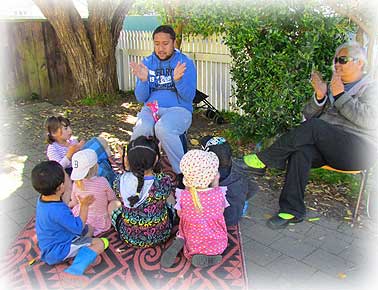Learning Te ReoBy the early 1900s, there were nearly a million colonists, in cities or on stolen Maori farmland, while many of the 40,000 remnant Te Reo-speaking Maori were on second-rate land in isolated rural areas, like Northland, the upper Whanganui River valley and the Uruwera ranges. The Maori vocab of colonists was little more than the mispronounced names of trees - kowri, toe-tra - some farm words - pikau, konaki, "puckerooed" - and pretty phrases from Maori love songs - haere mai, ka pai. In the 1930s, rural Maori began drifting to the cities for higher paid work, and by the 1950s they were migrating in their thousands, to Wellington, Christchurch, Auckland and even Sydney, Brisbane, London. But they needed good English language skills to move away from labouring jobs like butchering sheep or roadworking, and so the 1960s "Ten Guitar" generation of young Maori were taught to speak English but not Te Reo. And in losing their language, they also lost touch with their history, cultural pride and spiritual values.  In 1982 the first of hundreds of Kohanga Reo infant schools were opened with grandparents teaching the infants, followed in the next decade by total immersion Kura with all school subjects taught in Te Reo. Meanwhile Kapa Haka contests spread Te Reo to hundreds more young people. Later there were Maori classes teaching the basics to adults, both Maori, and also Pakeha like myself. In 1982 the first of hundreds of Kohanga Reo infant schools were opened with grandparents teaching the infants, followed in the next decade by total immersion Kura with all school subjects taught in Te Reo. Meanwhile Kapa Haka contests spread Te Reo to hundreds more young people. Later there were Maori classes teaching the basics to adults, both Maori, and also Pakeha like myself.There are now thousands of young Maori who speak Te Reo, and understand the value of the spiritual concepts it conveys, while many simple Maori words have entered the general New Zealand English vocabulary - hangi, hikoi, hui, iwi, karakia, kia ora, koha, mana, marae, mokopuna, moko, powhiri, tangi, taonga, tena koe, urupa, whanau. With a decline in Christian church attendance in New Zealand by young people, spiritual values are now being conveyed by Maoritanga, and in this song "Big Aroha" we find those deeper concepts are now entering mainstream Kiwi English usage. | ||||
The Slacks
|
Kiwi songs - Maori songs - Home
This
webpage put on the NZ Folksong website on Dec 11, 2016

